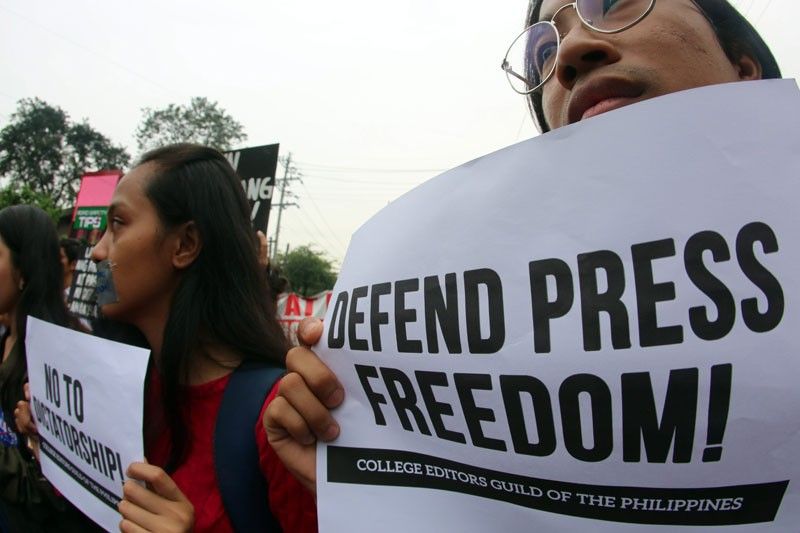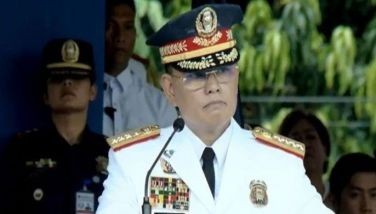Student journalists decry threats, harassment against UP campus publications

MANILA, Philippines — Student journalists from the University of the Philippines on Monday raised the alarm on reported death threats and accusations against campus publications.
Earlier that day, Tinig ng Plaridel, the official student newspaper of the UP College of Mass Communication in Diliman, reported in a series of tweets that it had received death threats from an anonymous account.
"Binabalaan namin kayo. Itigil niyo na ang ginagawa niyo. Kung ayaw niyong itumba namin kayo (We're warning you. If you don't want us to kill you, stop what you're doing),” one of the messages read.
Editors under UP Solidaridad, an alliance of student publications and writers' groups, also reported receiving similar threats from an account going by the name “Marcos Dimaculangan."
The threat came alongside a collage of photos of the organizations’ logos and their editors that read "Wanted Terorista ng UP Diliman."
The messages themselves and “Mag-ingat sa mga teroristang reporter ng teroristang grupong [Communist Party of the Philippines], [New People's Army], [at] [National Democratic Front] na nagtatago sa UP - Diliman. Terorismo ang inaatupag, sinisiraan ang gobyerno upang isulong ang terorismo.”
(Beware of the terrorist reporters of the CPP, NPA, [and] NDF terrorist groups hiding in UP - Diliman. What they're doing is terrorism, they are discrediting government to promote terrorism.)
Earlier, TNP received a message containing red-tagging and death threats from an anonymous account. The message included publications’ logos and pictures of student journalists in UP, of which include TNP's Editor-in-Chief.#DefendPressFreedom #DefendTheCampusPress pic.twitter.com/6rjYLTvfjY
— Tinig ng Plaridel (@tinigngplaridel) March 1, 2021
Human rights groups have warned against labelling dissent and criticism of the government as terrorism. The UN Human Rights Office warned in a report in June 2020 that the practice has become "increasingly institutionalized and normalized in ways that will be very difficult to reverse" in the Philippines.
"The focus is diverted to discrediting the messengers rather than examining the substance of the message. This has muddied the space for debate, disagreement and for challenging state institutions and policies," it also said then.
The labeling is rooted in the government's claim that being an activist, specifically within the national democratic movement, and being an armed communist rebel are the same. Although some activists have joined the underground communist movement, far more have not.
The label has also been extended to UP students in general.
President Rodrigo Duterte last year threatened to cut funding to UP, accusing them publicly—without proof—of recruiting students to become communist rebels. It turned out he was reacting to a student strike initiated by students of nearby Ateneo de Manila University.
In a statement, the College Editors Guild of the Philippines tagged the intimidation as "attempts to further attack the campus press and the press freedom in general that have been on the receiving end ever since Duterte fixated his priorities on his critics rather than the problems that needed to be addressed."
RELATED: Campus journalists decry threats on student who criticized Duterte administration
"[Student publications] have provided the Filipinos with reliable information and to tag them as enemies of the country [is] utter insanity and a cheap action to silence them," CEGP said, adding reporting by student journalists is meant to "voice out the calls of the marginalized and oppressed sectors and not for the downfall of the state."
Duterte and the media
Earlier in the coronavirus pandemic, the editor-in-chief of the University of the East's student publication was made to apologize for posting criticism of the government on social media in April.
Reports said barangay officials and his former high school teachers of the student reported him to authorities for what they felt was his offensive pronouncements about President Rodrigo Duterte, after which he was brought to the barangay hall of San Fernando Sur and threatened with libel charges.
But attacks on student journalists are only a symptom of a bigger distrust of the media in the Philippines.
RELATED: On World Press Freedom Day, groups wary of shrinking space for fundamental freedoms
Throughout his term, President Duterte and his aides have not been shy about tagging corporate news outlets as being purveyors of "fake news."
News organizations like Rappler and Inquirer have been featured unfavorably in the president's speeches, for example. He has also aired grievances over the reportage of ABS-CBN Corp., whose franchise was rejected by a House panel earlier in the quarantine.
"Tagging campus journalists as an enemy, a communist, or a terrorist when they merely expose the gory images of the Duterte regime is no longer a new tactic for the state," Tinig ng Plaridel said Monday. — Franco Luna
- Latest
- Trending





























